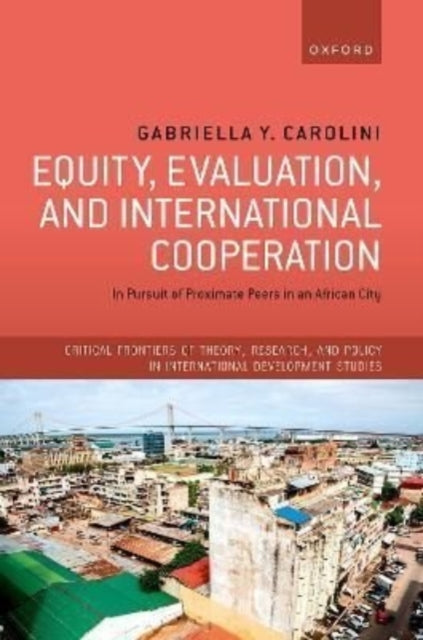Gabriella Y.Carolini
Equity, Evaluation, and International Cooperation: In Pursuit of Proximate Peers in an African City
Equity, Evaluation, and International Cooperation: In Pursuit of Proximate Peers in an African City
- Condition: Brand new
- UK Delivery times: Usually arrives within 2 - 3 working days
- UK Shipping: Fee starts at £2.39. Subject to product weight & dimension
Bulk ordering. Want 15 or more copies? Get a personalised quote and bigger discounts. Learn more about bulk orders.
Couldn't load pickup availability
- More about Equity, Evaluation, and International Cooperation: In Pursuit of Proximate Peers in an African City
South-South Cooperation (SSC) is different from other international partnerships in practice. Equity, Evaluation, and International Cooperation highlights two main lessons from the close examination of the ecosystem of international cooperation projects in the urban water-and-sanitation sector in Maputo, Mozambique. It argues that what matters in practice is whether hierarchy or heterarchy is institutionalized in the governance of cooperation projects, whether project partners are locally embedded in shared work spaces, and whether practitioners value flexibility and recognize the epistemic value of learning from all partners as peers.
Format: Hardback
Length: 240 pages
Publication date: 21 April 2022
Publisher: Oxford University Press
South-South Cooperation (SSC) is a unique approach to international partnerships that focuses on equity, evaluation, and international cooperation. While conventional scholarship on SSC often prioritizes macro-level narratives of geopolitical concerns and foreign aid outcomes, Equity, Evaluation, and International Cooperation offers a ground-up perspective. The book highlights two main lessons from examining the ecosystem of international cooperation projects in the urban water-and-sanitation sector in Maputo, Mozambique.
Firstly, it demonstrates that macro labels attributed to international cooperation reflect very little about how cooperation projects operate on the ground and the equity consequences of their work. These labels tend to be broad and general, failing to capture the nuances and complexities of the projects themselves.
Secondly, the book emphasizes the importance of how projects are designed, implemented, and evaluated. The quality of learning that emanates from partnerships is significantly influenced by the way projects are planned, executed, and assessed. Projects that prioritize flexibility, recognize the epistemic value of learning from all partners as peers, and promote equity are more likely to achieve sustainable outcomes and contribute to positive social change.
However, a strong evaluation culture within the international development industry often subjugates equity-based concerns and deep learning in projects to accountability. This reinforces orthodox power asymmetries in cooperation and sustains epistemic and distributive injustice.
In response to this, Equity, Evaluation, and International Cooperation provides a framework for how project evaluations can promote distributiv. Project evaluations should focus on promoting equity, learning, and sustainability, rather than solely on accountability and performance metrics. This requires a shift in mindset, where project evaluators are encouraged to consider the broader social, economic, and environmental impacts of their work and to engage with all stakeholders, including local communities and marginalized groups.
Furthermore, project evaluations should be designed to promote distributiv. This means that evaluation findings should be used to distribute resources and power more equitably, rather than to reinforce existing power structures. This can involve identifying and addressing barriers to equity, such as discrimination, lack of access to resources, and unequal power relations, and promoting collaboration and shared decision-making among all project partners.
To achieve this, project evaluators need to be trained and supported to adopt a more distributiv approach to evaluation. This includes developing a deeper understanding of equity, social justice, and sustainability, as well as adopting a more participatory and collaborative approach to evaluation.
In conclusion, South-South Cooperation (SSC) is a unique approach to international partnerships that emphasizes equity, evaluation, and international cooperation. While conventional scholarship on SSC often prioritizes macro-level narratives, Equity, Evaluation, and International Cooperation offers a ground-up perspective that highlights the importance of how projects are designed, implemented, and evaluated. By promoting distributiv in project evaluations, we can achieve more sustainable and equitable outcomes and contribute to positive social change.
Weight: 1g
Dimension: 240 x 163 x 21 (mm)
ISBN-13: 9780192865489
This item can be found in:
UK and International shipping information
UK and International shipping information
UK Delivery and returns information:
- Delivery within 2 - 3 days when ordering in the UK.
- Shipping fee for UK customers from £2.39. Fully tracked shipping service available.
- Returns policy: Return within 30 days of receipt for full refund.
International deliveries:
Shulph Ink now ships to Australia, Belgium, Canada, France, Germany, Ireland, Italy, India, Luxembourg Saudi Arabia, Singapore, Spain, Netherlands, New Zealand, United Arab Emirates, United States of America.
- Delivery times: within 5 - 10 days for international orders.
- Shipping fee: charges vary for overseas orders. Only tracked services are available for most international orders. Some countries have untracked shipping options.
- Customs charges: If ordering to addresses outside the United Kingdom, you may or may not incur additional customs and duties fees during local delivery.


